Cancer of the uterus — also called endometrial cancer — is increasing rapidly and may become the third most common cancer among women, and Black women die of it at twice the rate of white women, The New York Times is reporting.
Moreover, Black women have a higher incidence of a more aggressive form called non-endometrioid uterine cancer.
The Times article cites the results of a new study, Racial and Ethnic Differences in Hysterectomy-Corrected Uterine Corpus Cancer Mortality by Stage and Histologic Subtype, published in the latest edition of JAMA Oncology. The abstract notes that, “Uterine cancer incidence has been increasing, particularly rates of aggressive, nonendometrioid subtypes, which are disproportionately higher among non-Hispanic Black women.”
Uterine cancer is also increasing among younger populations as well — particularly women of childbearing age and women with no known risk factors.
Early warning signs include a change in menstrual bleeding, before or after menopause, along with pelvic pain and painful urination and intercourse. Survival rates are high when endometrial cancer is detected early.
The uterine cancer death rate for Black women is 31.4 per 100,000 women ages 40 and up, compared with 15.2 per 100,000 white women in the same age group.

“The striking statistic is that right now, in the year 2022, the number of women who will lose their lives to endometrial cancer in the U.S. is almost the same as those who will die of ovarian cancer, which is unbelievable to those of us in practice for the last 30 years,” Dr. Carol Brown, a gynecologic oncologist who is Memorial Sloan Kettering Cancer Center’s senior vice president and chief health equity officer, told The Times.
Researchers are not precisely sure what has caused the spike in endometrioid or non-endometrioid cancer. Indicators for the former include estrogen exposure, which is tied to obesity. Megan A. Clarke, lead researcher of the uterine cancer study, told The Times that the latter is more of a mystery, particularly its deadly effects on Black women. They are less likely to get an early diagnosis and more likely to die from it, regardless of when they are diagnosed.
The American Cancer Society is looking into this conundrum, according to The Times. “At every stage of diagnosis, there are different outcomes,” said Karen Knudsen, chief executive of the American Cancer Society. “Are they getting access to the same quality of cancer care?”
There is evidence that these women are not, The Times reported. An American College of Obstetricians and Gynecologists panel made some troubling discoveries: Black (and Hispanic) women with uterine cancer were less likely than white women to have a hysterectomy, to get a proper diagnosis of lymph nodes to test for the spread of cancer, and to get chemo.
In regard to Black women, Dr. Kemi Doll, a gynecologic oncologist at the University of Washington School of Medicine in Seattle, has for years been trying to determine why endometrial cancer has been so deadly, according to The Times. Among her discoveries is that ultrasound scans that measure the thickness of uterine walls — an indicator that something could be amiss — are less effective for women who have non-endometrioid uterine cancer.
Further, scans are also less effective in detecting a thickening of uterine walls when fibroids are present, leading to a later diagnosis in many Black women, many of whom have uterine fibroids.
Ignorance also plays a role in the incidence of uterine cancer, Doll asserts, because premenopausal women and perimenopausal women may not make the connection between their irregular menstrual cycles and cancer. “We need to rethink our guidelines,” she said. Women who have abnormal cycles and unusual bleeding throughout their lives are at highest risk: “It is the abnormality of the cycle that increases the risk of endometrial cancer, because of the dysregulation of hormones.”
Treatment for uterine cancer can include a full hysterectomy, and Black women have a higher rate of the procedure than other groups, The Times reported.
TheGrio is FREE on your TV via Apple TV, Amazon Fire, Roku, and Android TV. Please download theGrio mobile apps today!

